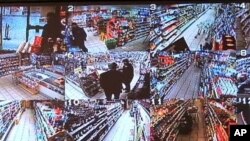Ever fancied yourself as an amateur detective? A new service called 'Internet Eyes' allows people in Europe to watch live security camera video from stores across Britain and further afield - to try to catch thieves in the act. Its creators say the service will soon be rolled out across the world. But critics say it's an example of the surveillance society going too far.
London grocer Kamlesh Patel has had enough of thieves targeting his store. Despite installing CCTV (closed-circuit television) cameras, he was still losing stock to shoplifters. So when he heard about Internet Eyes, he jumped at the chance to be one of the first clients.
“We’ve got six staff but even then we need someone who could look out for the store for us, because we can’t keep an eye on it 24/7," he said. "For us, shoplifting is a big problem. So now at least we know someone out there is looking after our store.”
The idea is simple. Live CCTV images from stores across Britain are streamed over the web. Volunteer viewers - like Robert Stevenson - can then log on and watch what's happening.
“If I see a problem I can click the alert button and within seconds the user of the camera is alerted," he said. "I actually lose the feed as it happens. But a possible crime could have been prevented in real-time. So in effect what this does is it changes a CCTV camera from being what I think is a passive deterrent sitting in the corner of the shop, to something which is a proactive, real-time security tool.”
So far, Internet Eyes has signed up more than 3,000 volunteer viewers. The most eagle-eyed are given cash rewards each month according to the number of potential crimes they’ve spotted.Critics, like Daniel Hamilton from the organization ‘Big Brother Watch’, say it’s an unfair invasion of privacy.
“What we have a problem with ‘Internet Eyes’ about is this is a vast voyeur’s paradise of people who can log on from their home - 'curtain-twitchers' - spying on innocent members of the public doing their shopping," he said. "We think that’s very wrong.”
But Internet Eyes founder Tony Morgan says his service is just helping shopkeepers survive.
“These cameras are in the shops anyway. Nobody worries about them if they’re not watched," he said. "All we’re doing is watching them and decreasing the cost of food. Because at the end of the day, if these chaps don’t lose 10 percent of what goes out of the door, they can reduce their prices.”
Viewers are not told the exact locations of the stores they're watching. And they are prevented from seeing images from their own neighborhood, to keep people from spying on their neighbors.
But tough privacy laws in many countries are preventing Internet Eyes from rolling out globally.
Nevertheless, Morgan has just returned from signing a deal to set up the service in Canada. He hopes one day Internet Eyes will be watched by a worldwide volunteer army of viewers.
“We’re all across Europe. We’re in every country in the European Commission," he said. "And we’re looking at America. And Argentina - believe it or not we can share data with Argentina.”
Grocer Kamlesh Patel is happy to pay $120 a month for the service.
“Since we’ve been on trial, we’ve had quite a few clicks where we’ve been very lucky to catch them in the act," he said. "And a couple have even been prosecuted.”
‘Internet Eyes’ will soon enable amateur detectives to spot crimes thousands of miles away - an example of technology shrinking our world.
But such advances are likely to intensify the debate over the tradeoff between privacy and security.




